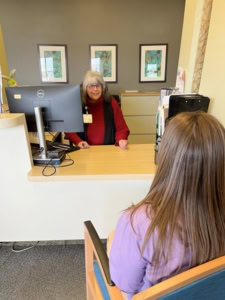The Essential Role of Front Desk Staff in Shaping Patient Experience

By Margo Schlewitz, MS, Manager, Multispecialty Practice Academic Ambulatory Care at the University of Michigan Health-West Community Health Center
The patient experience begins the moment an individual walks into a healthcare facility, and often, the front desk team sets the tone for the entire visit. These team members are crucial in building trust, creating a welcoming atmosphere, and ensuring a positive environment, especially during times of stress or uncertainty. Training front desk staff to be welcoming, efficient, and empathetic is vital to improving patient experience and loyalty.
The Human Connection: A Crucial First Step
Front desk receptionists are the first human interaction patients have with a facility, and their demeanor significantly impacts the patient’s experience. A warm greeting, a smile, and eye contact can immediately make a patient feel valued and at ease. This initial connection can reduce anxiety and set a positive tone for the visit.
Developing Observable Behaviors and Role Playing Toolkit
Patient feedback consistently highlights the importance of a positive front desk experience. Through surveys and conversations with our Patient and Family Advisory Councils, patients emphasized the value of being seen, heard, and treated with empathy, particularly during vulnerable moments. This insight led to the creation of a Role Playing Toolkit, designed to equip front desk staff with the skills necessary to foster a welcoming and respectful environment from the moment a patient arrives.
The Role Playing Toolkit: A Practical Approach
The Role Playing Toolkit was developed to help front desk staff improve key behaviors that influence the patient experience. It includes realistic scenarios and observable behaviors, providing managers with a resource for training and observations. The toolkit focuses on four key areas:
- Welcoming Presence: A friendly greeting, smile, and eye contact to create a welcoming environment.
- Respectful Communication: Active listening, offering full attention, and helping patients feel heard and understood.
- Clear Communication: Using positive language, explaining wait times, and being transparent with information.
- Problem-Solving: Handling challenges calmly, offering options, and showing patience to resolve difficult situations.
Practical Training for Real-World Scenarios
The toolkit includes role-playing exercises that simulate real-life challenges, such as delays or misunderstandings during patient check-ins. These scenarios allow staff to practice problem-solving and empathetic communication in a controlled setting, helping them become more confident and efficient in handling real-world situations. Consistent practice of these behaviors improves staff ability to manage patient interactions and fosters a stronger connection with patients.

Elevating Patient Experience Through Front Desk Excellence
The front desk plays a pivotal role in shaping the patient journey, and focusing on the human connection can enhance the overall experience. By using the Role Playing Toolkit, front desk staff can master the skills necessary to make patients feel valued and respected from their first interaction.
Coaching and Performance Evaluations
To ensure these behaviors are consistently practiced, the toolkit also includes a checklist for leaders to provide real-time feedback. This checklist helps managers recognize positive behaviors such as active listening, avoiding multitasking, and greeting patients warmly. By integrating this tool into staff meetings and performance evaluations, leaders can create a consistent approachto supporting front desk excellence, reinforcing the team’s role in delivering a positive patient experience.
About the author:
Margo holds a master’s in healthcare administration from The New School University and a bachelor’s from the University of Kansas. With over 30 years of healthcare leadership experience, she has worked in HIV/AIDS care, substance abuse treatment, and physician practice management.
She has served on the boards of HealthNet of West Michigan and the Health Equity Council of Kent County and spent nearly four years as a Peace Corps Volunteer in Guatemala. A strong advocate for vulnerable populations, Margo is committed to reducing health disparities and improving patient experience. She was honored with the 2024 Bill Barkley Pinnacle of Achievement Award by University of Michigan Health-West.
Related content
-
 Environment & Hospitality | Patient Family & Community Engagement
Environment & Hospitality | Patient Family & Community EngagementElevating the Emergency Department Experience: The Impact of Experience Ambassadors
By Jill Koss, Cook Children’s Medical Center At Cook Children’s Medical Center, we are committed to continuous innovation to enhance the patient and family experience. One key area of focus has been our Emergency Department (ED), where we identified an opportunity to improve the experience of waiting—both in the waiting area and after patients are placed
Learn more -
 Environment & Hospitality
Environment & HospitalityEnsuring Peace of Mind: 7 Elements All Lost Belongings Policies Should Include
By Gabriel Bolivar, Maui Health and Hope Ursy, Wellstar MCG Health On behalf of the Lost Belongings Workgroup of the Patient Advocacy Community This PX blog is the first of a series to build on the content from “Where Are My Things? Best Practices for Safeguarding Patient Belongings in Hospitals,” a handbook for those managing
Learn more -
 Quality & Clinical Excellence
Quality & Clinical ExcellenceConnecting Volunteers to Hospital Goals: An Inpatient Fall Prevention Program
Traditionally, volunteer programs focus on hours and the total number of volunteers, which misses the opportunity to show impact and a connection to hospital goals. In 2023, Mount Sinai Morningside’s goals focused on our values of flow, people, financial stewardship, and safety and quality. For safety and quality, the key performance indicator for 2023 was
Learn more
